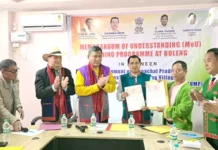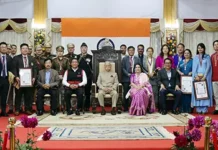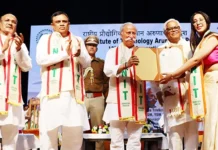NEW Delhi, 19 Jul: The Indian Journalists Union (IJU) in its national executive committee meeting held online on 19 July passed four critical resolutions addressing pressing issues concerning journalists’ welfare, safety, and press freedom in India.
The IJU called for urgent action from the Government of India, state governments, and relevant authorities to safeguard the rights, dignity, and security of journalists, who serve as the cornerstone of democracy.
The IJU strongly urged the Government of India and the Ministry of Railways to immediately reinstate the 50% railway fare concession for accredited journalists and the 40% concession for senior citizens, which have remained suspended since the Covid-19 pandemic.
“Journalists play a vital role in informing the public and strengthening democracy, while senior citizens deserve affordable travel to stay connected. Denying these concessions undermines their contributions to society,” said IJU President Geetartha Pathak.
The IJU expressed grave concern over the worsening state of press freedom in Jammu & Kashmir, where journalists face harassment, arbitrary arrests, prolonged interrogations, and economic strangulation through the curtailment of government advertisements.
“The systematic suppression of media voices in Jammu & Kashmir is a direct attack on democracy. The union government, lieutenant governor, and elected government must uphold constitutional guarantees of free speech and allow journalists to work without fear,” Pathak stated.
IJU Secretary-General Sabina Inderjit added, “The deliberate financial pressure on local newspapers and the climate of fear created by institutional attacks are unacceptable. We stand in solidarity with J&K journalists and demand an immediate end to their harassment, restoration of government advertising, and implementation of the Press Council of India’s recommendations.”
The IJU also resolved to demand a uniform pension policy for journalists across India to ensure financial security for retired journalists.
Highlighting the disparity in pension schemes across states, the IJU called for a minimum monthly pension of Rs 25,000 and uniform eligibility criteria, preferably 10 years of professional service. “Journalists risk their lives to uphold truth and democracy. A dignified pension is not charity but a recognition of their service,” said Inderjit.
The IJU urged the union government to frame model guidelines in consultation with stakeholders, and appealed to state governments to implement pension schemes aligned with these standards. “We will continue to raise our voice nationally and internationally to safeguard journalists’ rights,” Inderjit affirmed.
The IJU expressed deep concern over the rising incidents of attacks, harassment, intimidation, murder, and online trolling of journalists across India, which threaten press freedom and democratic values. The IJU demanded that all state governments immediately enact a Journalists’ Safety and Security Act, modelled on the Maharashtra Journalists’ Protection Act, to ensure the safety, security, and professional independence of journalists.
Additionally, the IJU urged the central government to introduce a comprehensive national legislation to provide uniform safeguards for journalists across all states.
“Journalists must be able to perform their duties without fear or favour. A uniform national law is essential to protect the constitutional right to freedom of speech and expression,” said Pathak.
The IJU remains steadfast in its commitment to advocating the welfare, safety, and rights of journalists across India. The union said it will continue its campaign at the state, national, and international levels to ensure the enactment of protective laws and policies that uphold the principles of free and fair journalism.



